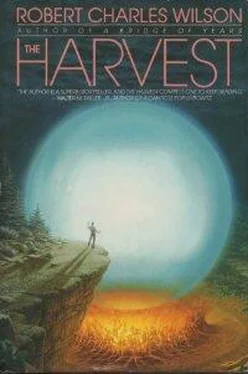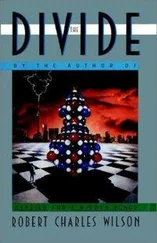In eighty days, he had seen a great deal of the country. He had crossed the Mississippi at Cairo, rolled through Arkansas into Texas, and sheltered for three weeks in the empty city of Dallas while storms raged overhead. He had skirted the Mexican border at El Paso and headed north along the Rio Grande, then west again on 1-40 across the Continental Divide.
He had pedaled through the immense deserts of the southwest, landscapes as large and strange as the moon. A cloudburst caught him in Arizona, filling the arroyos, spiking the arid hills with lightning and drenching him before he could find shelter. But he was never ill; he was never tired.
Now he was looking forward to the Salmon River Mountains, some of the most impassable territory in the continental United States—a wilderness of larch and hemlock, cedar and spruce.
At noon, he stopped at a nameless little farm town for lunch. He broke into a gas station cooler and pulled out two bottles of Grape Crush, drank one immediately and saved the second for later. In some towns, like this one, the electricity was still working—the soda was cool, if not icy. In the Handi-Mart next door he found TV dinners still preserved in a working freezer. That was unusual. The freezers didn’t always last without maintenance, even if the electricity was on. The TV dinners were past their best-by date, but only a little. The boy opened one and heated it in the store’s microwave oven. It tasted okay. He drank the second bottle of Grape Crush. It turned his lips purple.
The boy carried some items in a bag attached to the rear of the bike. After lunch, he opened the bag and took out a hat— a khaki bush hat from a hunting-and-fishing store back east. It didn’t fit too well, but it kept the afternoon sun off his face and neck.
He climbed onto his bike and pedaled down the white line, the precise meridian of the empty road. The wheel bearings sang a high, keen note into the silence.
He passed irrigation farms, big Ore-Ida potato plantations gone brown in the absence of humanity, then more sage prairie as he followed the Snake westward.
Near dusk, as he was thinking about breaking camp, the boy came around a slow curve into another tiny road town where a number of trucks and campers had parked in a string. He saw the motion of people among the vehicles.
The boy realized he knew a few things about who these people were and where they were going.
Their presence was troubling. It demanded a decision.
Paths diverged here. One way: the Salmon River Mountains, a last dalliance before he went Home. The other way: a less certain future.
It was perhaps not an accident that he had come across these people.
The boy stood with his bike between his legs, frowning at the choice.
Then he sighed and walked his bicycle to the nearest camper.
* * *
The camper was a dusty Travelaire. The rear door was open and an elderly woman sat in the doorway with a book across her knees. She wore a baggy cotton print dress and a blue quilt jacket over it. Her hair was gray and sparse. She was reading by the light of the low sun, squinting at the ricepaper pages of a King James Bible.
She looked up at the tick of the Nakamura’s oiled bearings. The boy stopped a yard away. He stood beside his bicycle gazing at her.
She gazed back.
“Hello,” she said at last.
Cautiously, the boy said, “Hi.”
She set the book aside. “I haven’t seen you before.”
“I was riding this way. From the east.”
“Are you alone?”
He nodded.
“No mother? No father?”
“They’re dead.”
“Oh. Well, that’s too bad.”
“It was a long time ago.”
“Are you going somewhere?”
“Nowhere in particular.”
“Are you hungry?”
It had been hours since lunch. He nodded.
“I have some food,” the woman said. “Fresh eggs and cured beef. And a little stove to cook it over. Would you care to join me?”
“All right,” the boy said.
He followed her into the camper. There was a propane stove inside. She lit it and put a skillet over the flame. The camper began to warm up. The day had been sunny and fairly nice, but nights were cold this time of year. The boy looked forward to sleeping inside.
He looked around the camper while she cooked. There wasn’t much to see. A few books, including the dog-eared Bible. A stack of scrapbooks that must have soaked up water at some time in the past—the covers were round, the pages wrinkled. Some clothes, unwashed. He sat at a small table, the folding kind.
Eggs sizzled in the skillet. The woman hummed a tune. The boy recognized it. It was an old song. “Unforgettable.” Nat King Cole made that one famous.
Long time ago.
He waited while she said grace, then tucked into a plate of scrambled eggs. “Here’s the salt,” the woman said. “Here’s pepper. I’m boiling water for coffee. Do you drink coffee?”
He nodded, mouth full.
“I suppose I’ll have to introduce you around.” She picked at her own eggs. “We’re a travelling group. We’re going east. There are other people east. We’re from Oregon. The coast. There was a terrible storm, and then—oh, but it’s a long story. You can hear it all later. Tell me, are you tired?”
“A little.”
“You must have come a long way on that bicycle.” He nodded.
“Yes,” she said, “I’ll introduce you tonight. There’s a meeting. Sort of a town meeting. If you call us a town. We can leave early if you like, but I think people will want to know you’re here… My Lord, I don’t even know your name! Pardon my manners. I’m Miriam. Miriam Flett. And you are—?”
“William,” he said.
“William—?”
“Just William.”
“Misplaced your last name?”
He shrugged.
“Well. I’m pleased to meet you anyway, William. And I’m sure everyone else will be, too.” She took a delicate bite of eggs, eating slowly, old-lady style. “It won’t be troublesome,” she said. “There are only ten of us. Well, eleven, including that Colonel Tyler.”
Beth Porter shook the boy’s hand and gazed a moment at his wide blue eyes.
They were strange eyes for a kid that age, Beth thought. Too… something. Calm? Calm but observant.
But he seemed like a nice-enough kid. People seemed to enjoy seeing a new face. Everybody shook William’s hand and made welcome noises at him. Even Colonel Tyler bent and ruffled the boy’s hair—though William’s smile at that moment looked suddenly less genuine. And that was odd, too, Beth thought.
Then Matt Wheeler called the meeting to order.
They had gathered in the living room of a little wood-frame house next to a gas station. The house was dusty and stale from being closed up so long, but cozy enough on a chilly spring night. Matt had brought in ten folding chairs from his camper. Tom Kindle had plugged in an electric heater, which was minimal help, but what really mattered, Beth thought, was that they had come over the Cascades into the Land of the Functioning Wall Sockets. She guessed it was some Helper voodoo that kept the electricity working in all these derelict towns… as in Buchanan before the storm trashed everything. She didn’t care. Lights that didn’t need batteries: heaven. Hot water: bliss.
This very afternoon they had broken into the house and taken turns under a working shower. Beth recalled that first amazing flourish of steamy water on the skin of her back. It was like the caress of some fiery angel. She’d been savoring the memory for hours.
She settled into a folding chair next to Abby Cushman, a row behind Joey. Up front, with the room’s two sixty-watt floor lamps making him look pale and skinny, Matt Wheeler zipped through some old business, chiefly the news that Joey had scavenged a portable ham rig in Twin Falls, plus a quick unanimous “aye” on the proposition to continue east first thing tomorrow.
Читать дальше












